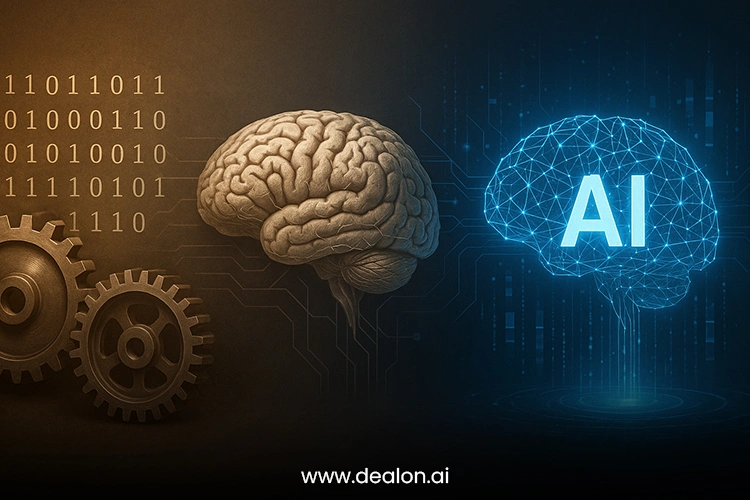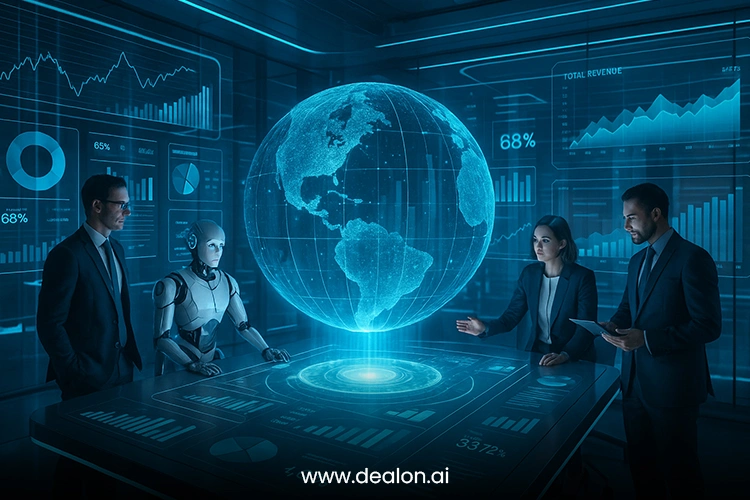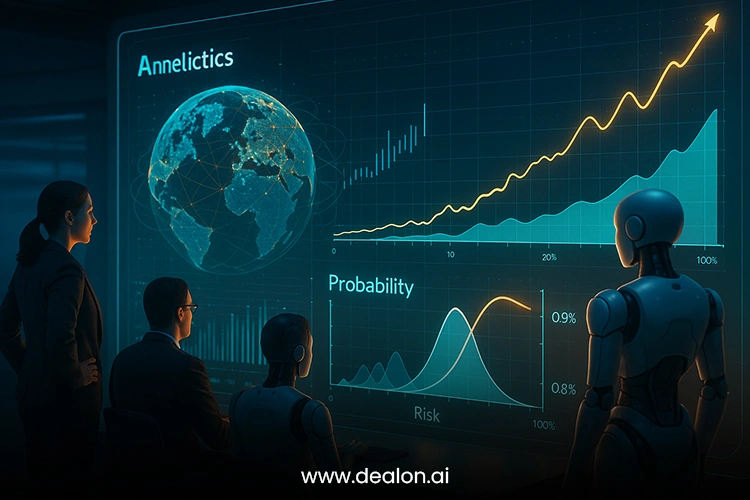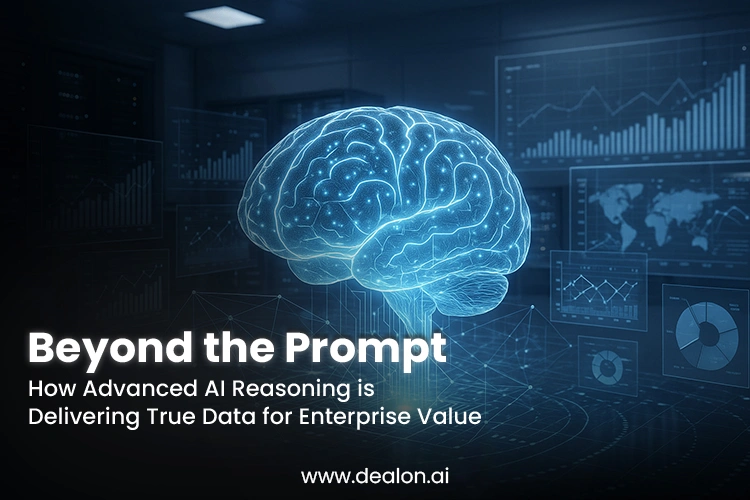As our technological world is disrupted, more businesses are resorting to high-level artificial intelligence (AI) to have a competitive advantage. Although the potential of AI has always been to automate simple tasks, the introduction of advanced AI reasoning systems is transforming how organizations go about strategy, decision-making, and innovation. Advanced AI reasoning models are created in such a way that they are supposed to simulate a human-like thought process, unlike conventional rule-based systems, which are limited to analyzing a large amount of data, finding latent patterns, and creating actionable insights that make a business grow. This is a significant advancement in the use of AI to bring real enterprise value by making automation an innovative process.
With companies struggling to adapt to the realities of operating in the modern market, the need to develop AI solutions that would go beyond a single prompt and a preset set of instructions is increasing. High-order AI reasoning enables the dynamic decision-making process, because of its contextual awareness, inferences, and a remarkable ability to predict the future with high precision. Such capabilities can help organizations not only to streamline their operations but also to be innovative, highly personalized to customers, and reduce risks in an increasingly unstable environment.
Moreover, this AI reasoning of the next generation opens the world to a new generation of enterprise value creation. With a practical implementation of AI systems into the processes of the core business, organizations are enabled to make quicker and more data-based decisions, enhance efficiency, and open new opportunities to grow.
With the companies still trying to tap into the tremendous potential of AI, one cannot deny the revolutionary nature of the changes in industries such as healthcare, finance, and manufacturing, among others. This blog will explore the way developed AI decision-making is transforming businesses by providing real-time value and paving the way to the future where intelligence is not only automated but fundamentally embedded within the planning and structure of business.
Also Read: Why Companies Need a Proactive AI Ethics Strategy In 2025
Learning the History of AI Reasoning: Simple algorithms to complex decisions

Since its beginning, artificial intelligence has been experiencing a spectacular transformation. In its early years, AI was characterized mainly by rule-based systems, which operated according to a set of preset instructions to perform tasks. Although these systems were effective in repetitive tasks, they were limited by the fact that they could not adjust to new circumstances or experiences. This means that they were mainly applied in simple automation, whereby there was little ability in complex decision-making and problem-solving.
With the assistance of the ML algorithms, AI would be able to acknowledge trends and predictions, and would improve over time and with exposure to more data. The concept of deep learning, relying on the application of artificial neural networks to replicate the activity of the human brain, also played a role in the fact that AI has developed the ability to operate massive amounts of raw data, such as images, audio, and text. It marked the beginning of a new period of AI as deterministic algorithms were being transformed into data-driven models.
In modern times, AI reasoning has been developed further, and it contains cognitive abilities that mimic the decision-making process among human beings. The advanced AI systems are no longer merely the processors of information, but now they can think, understand the surrounding world, and make finer judgments. The integration of natural language processing that permits machines to comprehend and generate human language has contributed to this a great deal. NLP, as well as reasoning and contextual understanding, has made AI solve problems that before were perceived to need human judgment, including legal analysis, medical diagnosis, and strategic business planning.
This new step is characterized by the fact that AI systems are not passive elements in the decision-making process and become active participants. They can evaluate complicated situations, create insights, and give suggestions, enabling companies to shift their focus from reactive decision-making to a data-oriented, proactive strategy. The advanced AI reasoning is, thus, critical to not only automate processes but also improve the human decision-making process with greater intelligence.
Debriefing True Enterprise Value with Data-Driven Decisions

The core strength of AI in creating enterprise value is its unmatched capability to process and analyse high volumes of data at speeds that are much higher than those of human beings. In the digital era, information is usually defined as the new oil; however, the real worth of the information does not exist in the data itself but in the knowledge that can be obtained from it. In this case, advanced AI reasoning can be viewed as a mandatory tool that will help businesses extract the maximum out of their data.
The AI can be used to analyze large amounts of data to detect hidden patterns, correlations, and trends that humans could hardly notice without utilizing sophisticated ML algorithms and data analytics techniques. It may be the behavioral pattern of the customers, the market forces, or the internal operation metrics. Still, AI-driven analytics can discover something valuable that could serve to inform strategic decision-making.
Using the example of customer relationship management, AI can process previous purchasing data, demographic information, and internet communication to understand what product or service a client will probably buy next. This will enable companies to tailor marketing activities, improve pricing, and even forecast the churn. In supply chain management, AI may utilize the stock levels, demand, and external indicators of weather or geopolitics to optimize the procurement strategies and avoid such risks as stockouts or overstocking.
AI can also be helpful in strategic planning, where it can help businesses to identify new opportunities in the market, to see the threats posed by competitors, and to optimize resource distribution. Companies can make data-driven decisions, which help to reduce uncertainty, minimize risks, and maximize profitability. Intelligent AI reasoning, thus, serves as an effective driver of turning raw data into business intelligence. It enables organizations to exit the intuition-based decision-making and move to evidence-based and data-driven decision-making that gives them a considerable competitive advantage.
Improving Forecasting and Risk Mitigation by Improving Predictive Capabilities

Among the most substantial benefits of highly developed AI reasoning, one can distinguish the possibility to increase the predictive skills of businesses by providing businesses with the means they predict future trends with the accuracy that previously was inconceivable. Non-modern forecasting techniques, appearing very much dependent on the past, and the use of relatively fixed models, are frequently constrained by the fact that they do not take into consideration the dynamism and interrelations of business drivers. As an example, historical data is effective in generating patterns (predicting trends) based on past performance. Still, it might not reflect the impact of the current data, market fluctuations, or the effect of sudden changes in consumer behavior.
Conversely, AI-based predictive models can combine a broad set of variables into their forecasting model, including real-time, external market forces, and even subjective human factors. This enables AI to come up with exact predictions, which are indicative of the complexities of the current business world. Indicatively, in the finance sector, AI can examine the sentiment in the market, economic trends, and global occurrences in anticipating stock market trends or the fluctuation of interest rates. In the medical field, artificial intelligence will predict the results of patients based on their medical history, treatment schedules, and demographics.
Developed AI reasoning is also instrumental in the mitigation of risks. The conventional risk management approaches usually use the preset risk models, which presuppose a comparatively stable environment. But in the modern world, which is fast-paced, business risks are continuously changing. AI-based risk models are designed to accommodate such changes.
As new data is produced, they can update the risk model in real time to enable the organization to counter the risks before they become a significant issue. It can identify disruptions in supply chains, anticipate financial crises, and anticipate cybercrime attacks: AI has predictive capabilities that allow organizations to make well-informed decisions and take proactive measures that will protect their interests and assets.
The skill to predict the trends in the future and reduce risks in early stages is especially useful in those industries where market dynamics, customer needs, and operational issues may carry a substantial financial and strategic cost. To illustrate, in the manufacturing sector, AI can forecast when a particular piece of equipment will break down, and businesses will be able to foresee the maintenance and prevent a loss of revenue due to unplanned downtime. Within the retail sector, AI will be able to forecast seasonal demand variations, enabling an enterprise to save on inventory and minimize waste.
Streamlining Processes with Self-driving AI Systems
Business operations are changing with the inclusion of high-order AI reasoning to introduce a new dimension in decision-making and operational performance. Previously, AI-based automation was primarily used in simple and repetitive work, such as data input, chatbots to address customer questions, and simple inventory management. But with the maturity of AI technology, it has been able to achieve much, and in fact, systems can perform much more complex functions that involve complex decision-making.
Learning AI systems can now make high-level decisions previously the prerogative of human managers. These systems can recognize the inefficiencies of production lines, streamline supply chain logistics, and suggest ways to improve processes through constant data analysis and interpretation of information collected and shared across several sources. As an example, AI can track the workflow of production and identify bottlenecks, as well as propose other options to address operations optimization. This aspect saves a lot in terms of manual interference, thus minimizing human error and enhancing efficiency.
The ability to scale across different functions of a business is one of the most effective features of autonomous AI. In logistics, such as in the calculation of the most efficient route of delivery trucks, AI is independent in calculating all the variables based on the weather conditions, the flow of traffic, and the schedule of the delivery. Artificial intelligence, used in manufacturing, will be able to automatically change the production plan depending on changes in demand and the availability of raw materials, making sure that resources are continuously distributed most efficiently. Such autonomous systems are capable of working around the clock, and their data analysis and decisions are much faster and more accurate than what human beings can achieve.
Automation of these decision-making processes by businesses saves them not only time and increases operational costs, but it also liberates human employees to concentrate on more strategic, creative, and value-added processes. This transition enables organizations to be agile as they can adapt fast to the demands of the market and changes all over the world. Self-directed AI systems, therefore, open the way for companies to operate with more accuracy, rapidity, and flexibility in a more competitive environment.
Powering the Innovations with the Cognitive AI Systems
Innovation is at the core of every successful business, and innovative AI reasoning is offering organizations unprecedented means of fueling their creative and research-driven operations. Contrary to the traditional AI systems, which Romantically adhered to strict, rule-based commands, cognitive AI systems are intended to imitate the multidimensional, adaptive nature of human thought. These systems can perceive, learn, and reason new insights out of complex data, coming up with new ideas and solutions that push the frontiers of innovation.
The ability of cognitive AI systems to detect patterns in large datasets is an inherent ability that implies introducing new methods of solving problems and innovations. To illustrate, within the context of product development, AI can scan customer reviews, track market trends, and analyze competitor products to determine emerging needs and gaps in the market. According to this analysis, AI has the potential to suggest new features or even a whole new product, which would be in line with customer demand, to companies so that they stay on the curve in a rapidly moving marketplace.
Cognitive AI is powerful in other aspects of innovation, such as product development. These systems are helpful in research and development (R&D), where a large amount of data can be simulated and analyzed to make discoveries more quickly about new materials, drugs, and technologies. In the case of pharmaceutical research, AI models can be used to predict the behavior of complex compounds, spot patterns in genetic data used in precision medicine, and propose new designs to be used in engineering projects. This increases the rate of innovation, which makes organizations introduce groundbreaking solutions into the market faster and more efficiently, and effectively than previously.
Businesses are developing an innovation culture by introducing cognitive AI in their R&D processes. These AI systems are not assistants; they are actively engaged in the ideation process, which can provide priceless information and ideas that can be used to improve the creative capacity of human teams. This transformation allows the organization to pursue newer ventures of development, and this enhances its competitiveness in the industries where it is essential to be ahead of the innovation curve or be driven out of the market.
Balancing Customer Experiences through Personalized AI Solutions
The new demands of an increasing number of customers have made personalized experiences one of the critical aspects of customer loyalty and business performance. Intelligence of AI at its mature stage can be beneficial in assisting companies in providing a personalized product, service, and experience that is unique to the requirements and desires of the customer. This is much more customized than the old school of customer segmentation, and it provides personalized experiences that can not only contribute to customer satisfaction but also create long-term relationships.
Such systems could then use this information to create vibrant profiles of customers, enabling businesses to make personal recommendations, offers, and experiences. As an illustration, in the e-commerce market, AI is capable of recommending consumer goods to its customers, depending on their previous purchasing history, tastes, and even the activities of other consumers. Not only does this customized shopping experience have the effect of boosting the chances of purchase, but it also enhances customer satisfaction.
In sectors such as health, AI will have an opportunity to personalize the treatment plans to individual patients and the information on their health history, their genetic data, and lifestyle conditions. With AI, personalized health advice, like dietary prescriptions or exercise plans, can be created, giving patients a chance to manage their health like never before.
The capability to offer these types of personalized experiences has become a major competitive factor for businesses because the experience creates stronger brand connections and customer loyalty. Customers will feel appreciated when they become more likely to revisit early, purchase again, and market the company to other customers. Customer retention is also improved through AI-based personalization since companies can predict customer churn cases and intervene with them with a personalized offer or intervention to prevent defection.
When using the power of custom AI solutions, companies will be able to build deeper relationships with their customers. This not only results in increased satisfaction and loyalty but also contributes to increased revenues. Being able to adjust to the tastes and expectations of each customer enables businesses to provide better service, which will eventually make them stand out in a saturated market.
Avoiding Ethical Problems in the Higher AI Reasoning
With the current progress of AI technology and its further penetration into the functioning of enterprises, new ethical issues regarding the use of AI technology arise. The lack of transparency in the decision-making process of the AI systems is one of the key issues. Such black-box models, most common in sophisticated AI, may yield results that are not easily understandable by humans, raising questions of accountability and fairness. An example of this is that AI decision-making in fields such as hiring, lending, or even law enforcement can have profound effects on society. Still, the decision-making rationale is not readily comprehended.
To address such ethical issues, organizations should adopt rigid ethical AI implementation frameworks. This is done by developing AI systems that are clear and understandable and are not biased. It ought to undertake regular audits, continuously check the unintended consequences, and align it with the values and the law of the organization. By making sure the decisions made by AI can be justified and explained, the companies can ensure that they do not lose their trust with their stakeholders, which might cause the latter to react adversely. The companies would be confirmed as upholding their ethical and moral standards.
An ethical AI culture is not only about compliance, but it is about ensuring that AI is of good to all in society (both customers and employees, as well as communities, etc.). In such a way, companies will be able to reduce risks, build their reputation, and create a future that is sustainable and inclusive.
Conclusion: AI-Driven Enterprise Value is the Future
Sophisticated AI thinking is not a technology innovation; it is a necessary resource transforming industries and defining the success of businesses. AI is contributing to the practical value in industries through its capability to process data, forecast trends, automate procedures, and promote innovations. To be competitive, companies should adopt the best AI reasoning and make it part of their main strategies. The companies that leverage the power of AI fully will not only succeed in the digital age, but they will also be at the forefront in working with the complex business worlds and guaranteeing the long-term development and sustainable competitive advantage.

